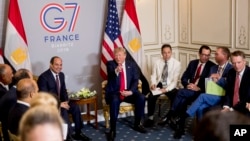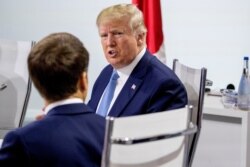G-7 leaders are closing their summit Monday with discussions about the climate and digital transformation, though those issues are likely to be overshadowed by a closing joint news conference with U.S. President Donald Trump and French President Emmanuel Macron.
Trump grabbed early headlines Monday as he expressed optimism to reporters for trade deals with China and Japan, as well as prospects for an agreement with Iran.
Those comments came while Trump sat next to Egyptian President Abdel Fattah El-Sissi in what is usually a brief encounter with reporters before leaders go into a private meeting. Trump took questions for about 10 minutes.
Trump downplayed any sense of tension between himself and French President Emmanuel Macron, after the French leader met Sunday with Iranian Foreign Minister Mohammad Javad Zarif.
"I knew he was coming in, and I respected the fact that he was coming in," said Trump, who added that he gave Macron his approval.
Trump, who withdrew from the international agreement on Iran's nuclear deal last year, said new negotiations would include Iran's nuclear program and its ballistic missiles. He criticized the length of the 2015 Joint Comprehensive Plan of Action as being too short.
"Iran has a chance to really build themselves up and be a very great nation, greater than before. But they have to stop terrorism," Trump said.
At the summit, Macron introduced a plan to defuse rising tensions in the Gulf by partially lifting the U.S. oil embargo on Iran in exchange for Tehran's returning to full compliance to the 2015 deal that restricts its nuclear program.
He told LCI television that members had agreed on a joint action on Iran.
Trump continues to resist pressure from his G-7 counterparts to rejoin the nuclear pact with Iran, a deal that's considered a signature achievement of the Obama administration. After abandoning the pact, he slapped crippling sanctions on Tehran.
China trade tensions
G-7 leaders here have expressed concern about the escalation of the U.S.-China trade fight, with summit host Macron saying he hopes for leaders to pull back from an all-out trade war.
"I want to convince all our partners that tensions, and trade tensions in particular are bad for everybody," he said in a speech.
Speaking alongside Trump during a working breakfast meeting, British Prime Minister Boris Johnson publicly refuted Trump's statement that other leaders have not pressured him to give up the trade war with China, believed to be causing uncertainty in the global economy and volatility in stock markets.
"Just to register the faint, sheep-like note of our view on the trade war, we're in favor of trade peace on the whole, and dialing it down if we can," Johnson said.
Johnson is seen as a natural ally to Trump due to similarities in their populist policies and Brexit.
Trump, in his comments Monday, seemed optimistic about reaching a trade deal with China, saying, "I think we're going to make a deal."
He said China had contacted U.S. trade officials by phone seeking to return to the negotiating table.
"We are going to start talking very seriously. We'll see how that goes," Trump said.





